
Nurturing Emotional Resilience: Guiding Children through Jealousy and Envy
Jealousy and envy are universal human emotions that have the power to shape our thoughts, actions, and relationships. In the realm of child development, these emotions take on a unique significance as they navigate the complexities of their growing world. Jealousy, like all emotions, is a normal human response, often arising from a sense of insecurity, competition, or fear of loss. Envy, on the other hand, revolves around the desire for what others possess. In the context of children, these emotions can be particularly potent, manifesting in various ways and influencing their social interactions, self-esteem, and overall emotional well-being.
Understanding and effectively addressing jealousy and envy in children is pivotal for fostering their emotional intelligence, shaping healthy relationships, and nurturing a positive self-concept. As children encounter new experiences, such as the arrival of a sibling or interactions with peers, jealousy can emerge, offering parents and caregivers an opportunity to guide their children through these intricate emotional territories.
In this exploration, we delve into the nuances of jealousy and envy in children, recognizing the factors that trigger these emotions and the ways they can influence children's behaviors. We will uncover strategies that parents and caregivers can employ to help children manage and channel these emotions constructively. By delving into the underlying psychology, early signs, potential long-term impacts, and preventive measures, we aim to equip readers with insights that empower them to navigate this essential aspect of children's emotional development.
Jealousy in Children: Causes and Impact
Jealousy in children is a complex emotional response that can arise from various sources and situations. Understanding the underlying causes and potential impact of jealousy is crucial for parents, caregivers, and educators to provide effective support and guidance to children as they navigate these feelings.
A. Factors Contributing to Jealousy in Children
Sibling Rivalry: One of the most common triggers for jealousy in children is sibling rivalry. The arrival of a new sibling disrupts the dynamics of attention and affection within the family. Children may feel threatened by the division of their parents' love and fear being overshadowed by the new addition.
Parenting Mistakes: Certain parenting practices can inadvertently fuel jealousy. Over pampering a child can lead to feelings of entitlement, making them more susceptible to jealousy when they perceive others receiving attention or rewards. Overprotecting a child may hinder their self-confidence and autonomy, intensifying feelings of insecurity.
Unhealthy Comparisons: Comparing a child's achievements, behavior, or qualities with those of their peers or siblings can breed jealousy. Such comparisons can lead to feelings of inadequacy, resentment, and rivalry, ultimately eroding the child's self-esteem.
B. Emotional Impact of Jealousy
Signs of Jealousy: Jealousy in children can manifest through various signs and behaviors. These may include overt expressions like complaining, copying, or bullying others. Alternatively, jealousy might manifest subtly through increased sensitivity, possessiveness, or irritability around certain situations or individuals.
Relationship with Other Emotions: Jealousy often coexists with other complex emotions, such as anger, anxiety, and resentment. Children may feel a range of negative emotions, sometimes struggling to differentiate between jealousy and these related feelings.
Understanding the causes and signs of jealousy is only the first step. Acknowledging that jealousy is a natural emotion and a part of human development helps parents and caregivers approach these situations with empathy and an open mindset. By recognizing these triggers and manifestations, adults can create a safe space for children to express their feelings and learn healthier ways to cope with jealousy.
Strategies to Handle Jealousy in Children
Navigating jealousy in children requires a proactive and empathetic approach from parents and caregivers. Implementing effective strategies can help children manage their emotions, develop healthy coping mechanisms, and build strong emotional intelligence. Here are several strategies to assist children in handling jealousy:
A. Turning Envy into Ambition
One powerful way to address jealousy is by redirecting negative emotions into positive actions. For instance, when a child feels envious of a peer's accomplishments, parents can encourage the child to channel that energy into their own goals. By motivating the child to improve their skills or achieve their ambitions, the focus shifts from competition to personal growth, fostering a sense of empowerment.
B. Active Listening
Open communication is essential in addressing jealousy. Take time to listen actively when a child expresses feelings of jealousy. By understanding the root causes and triggers, parents can offer guidance and support tailored to the child's individual concerns. This practice also demonstrates to the child that their feelings are valid and acknowledged.
C. Using Examples
Parents can employ storytelling and anecdotes to teach children the importance of positive feelings and admiration for others. By sharing personal experiences or narratives from literature, parents help children grasp the value of celebrating others' achievements without fostering jealousy. Modeling these behaviors can shape the child's perspective on jealousy.
D. Teaching the Importance of Sharing
Encouraging children to share not only their possessions but also their emotions can help alleviate feelings of jealousy. When children learn the significance of cooperation and empathy, they develop a sense of security and belonging, reducing the inclination toward jealousy. This strategy fosters an environment of mutual respect and support among siblings and peers.
E. Reinforcing Individual Strengths
Every child possesses unique qualities and strengths. Focusing on and celebrating these attributes can boost a child's self-esteem and self-worth. By acknowledging their individuality, parents help children build confidence, which, in turn, diminishes the need for comparison and envy.
F. Withholding from Comparisons
Avoiding comparisons between children is crucial in preventing jealousy. Instead of pitting one child against another, encourage each child to set personal goals and celebrate their progress. By emphasizing personal growth over competition, parents promote a healthy self-concept and reduce jealousy-inducing behaviors.
G. Communication and Love
Open dialogue and emotional support play a central role in addressing jealousy. Create an environment where children feel comfortable expressing their emotions without fear of judgment. Assure them of your unwavering love and offer guidance on managing jealousy in a constructive manner.
By implementing these strategies, parents and caregivers can guide children toward emotional maturity and equip them with the skills to manage jealousy effectively. Through proactive communication and fostering a positive emotional environment, children can develop a greater understanding of their emotions and learn to navigate the challenges of jealousy in healthy ways.
Long-term Impact and Prevention
Understanding the long-term implications of jealousy in children is crucial for parents and caregivers to proactively address and prevent potential negative outcomes. By recognizing the potential consequences and taking preventive measures, adults can lay the foundation for healthier emotional development and well-being in the future.
A. Recognizing Early Signs of Jealousy
Jealousy can manifest in children at an early age, even in infants as young as four to five months old. This early manifestation highlights the significance of addressing and managing jealousy from the earliest stages of development. Parents and caregivers who are attuned to subtle signs of jealousy can intervene with appropriate strategies to guide children's emotional growth.
B. Jealousy and Mental Health
Jealousy that goes unaddressed can potentially contribute to mental health challenges in the long run. Intense jealousy can lead to anxiety, stress, and even paranoia, which may persist into adulthood. If left unmanaged, these emotional struggles could increase the risk of developing more severe mental disorders, negatively impacting overall well-being.
C. Preventive Measures
Creating an Environment of Equality: Ensure that all children receive equitable attention, love, and support. Avoid favoritism and work toward fostering an environment where each child feels valued and secure.
Avoiding Parenting Mistakes: Be mindful of over-pampering, overprotecting, and making unhealthy comparisons between children. Instead, encourage each child's unique qualities and strengths.
Teaching Emotional Intelligence: Educate children about recognizing and managing their emotions. Help them understand that jealousy is a natural emotion but can be addressed constructively.
Fostering Empathy: Encourage children to see situations from others' perspectives. Developing empathy can help children appreciate others' achievements without feeling threatened.
Open Communication: Establish open lines of communication with children. Encourage them to express their feelings and concerns, and offer guidance on handling jealousy in healthy ways.
Positive Role Modeling: Model healthy behavior by managing your own feelings of jealousy and envy. Show children that it's possible to celebrate others' successes without feeling diminished.
Building Self-Esteem: Nurture children's self-esteem by highlighting their strengths and achievements. A strong sense of self-worth can reduce the need for comparison and envy.
By adopting these preventive measures, parents and caregivers play a crucial role in shaping children's emotional resilience and overall mental well-being. Addressing jealousy early on and fostering a positive emotional environment can help children navigate their emotions effectively, develop strong interpersonal skills, and build a foundation for a healthier and more fulfilling adulthood.
Summary
Jealousy and envy, as normal and natural emotions, hold significant implications for children's emotional growth and well-being. By recognizing the triggers, signs, and impact of jealousy, parents and caregivers can play a pivotal role in guiding children toward managing these emotions constructively. Sibling rivalry, parenting mistakes, and unhealthy comparisons can all contribute to the emergence of jealousy, which, when unaddressed, can lead to negative consequences in the long term.
Strategies to handle jealousy in children involve fostering open communication, encouraging positive behavior, and nurturing a supportive environment. Transforming envy into ambition, teaching the importance of sharing, and reinforcing individual strengths empower children to navigate jealousy in a healthy manner. As children learn to manage their emotions, they develop valuable life skills such as empathy, self-esteem, and effective communication.
Understanding that jealousy is a part of human nature helps parents and caregivers approach these conversations with empathy and sensitivity. Recognizing early signs of jealousy and addressing them with appropriate interventions can prevent the escalation of negative emotions and ensure a smoother emotional development journey for children. Moreover, the connection between jealousy and mental health underscores the importance of proactive prevention through balanced parenting, emotional education, and positive role modeling.
Ultimately, by actively addressing jealousy and envy, adults can foster an environment that promotes emotional intelligence, self-awareness, and positive relationships in children. The lessons learned during childhood lay the groundwork for healthier emotional responses and well-being in adulthood. Through conscious efforts and nurturing guidance, parents and caregivers can empower children to navigate the complexities of jealousy, promoting emotional resilience and a brighter future.







